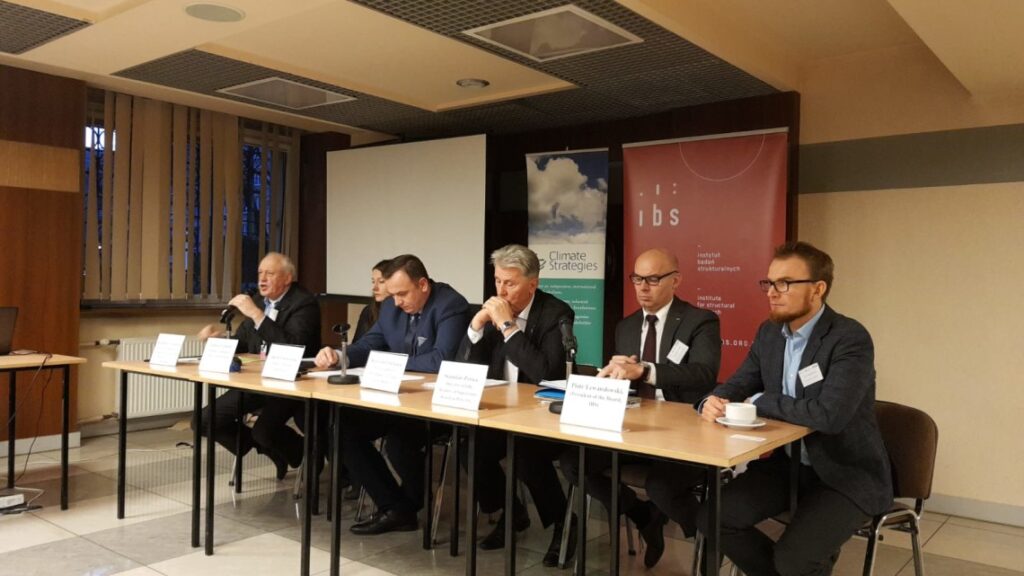“What might feasible, fair and consistent with the Paris Agreement (below 2ºC) pathways look like?” was the key question of the worksop organised by Climate Strategies (CS), Institute for Structural Research (IBS) and Institut du Développement Durable et des Relations Internationales (IDDRI). The workshop took place in Katowice in Central Mining Institute (Plac Gwarków 1) on Monday, the 10th of December 2018.
The workshop was focused on these crucial questions:
- How will the transition in coal sector affect coal production and consumption?
- What social and economic consequences could such changes entail?
- How should the transition challenges be reflected in strategies for the Polish coal sector, workers, companies and communities?
The purpose of the workshop was to present possible transformation pathways in the coal sector and their effects on the labour market and the energy security of Poland. Andrzej Błachowicz (Climate Strategies) opened the event and moderated the first session. First part focused on the transition’s implications on the labour market in Poland. It was followed by a case study from Germany and a brief overview of cases from South Africa, India, China and Australia. Invited stakeholders then commented on the research input and discussed feasibility of proposed pathways and solutions.
Snapshot of policy initiatives on coal transitions from around the world
Oliver Sartor (IDDRI) presented the main results of the Coal Transitions project involving research organisations from Australia, China, France, India, Republic of South Africa and UK. Sartor argued that transition in the coal sector is already happening in many countries striving at reduction in use of this raw material. He also indicated the trend of reducing costs in generation of renewable energy, its broader use and emerging of new jobs related with clean technologies. Sartor argued that transition in accordance with the Paris targets is possible if planning involving long-term trends is applied. This way, it would be possible to avoid risks related with energy security, growing energy prices and reduction of employment in mining.
Coal transitions pathways – challenges and opportunities for Poland
Jan Witajewski-Baltvilks and Aleksander Szpor of the Institute for Structural Research (IBS) presented the results of the report on transition of the mining sector in Poland. Szpor reminded that the energy sector and its dominating element, coal, are the main source of CO2 emissions. He also mentioned the different significance of the individual types of coal for the economy and the energy sector, as well as their different role on the regional level.
Jan Witajewski-Baltvilks presented studies concerning possible paths of transition to achieve the ambitious goals of emission reduction, but without lay-offs in the mining sector. According to the analysis based on the optimal energy mix model (MOEM, the scenario of reducing emissions down the level expected by the European Commission is feasible if the energy efficiency is improved, emissions in transport are reduced and the share of renewable energy sources in energy generation is increased.
It should be noted that this scenario would not involve lay-offs in mining on a large scale. The sector would be phased down gradually, even in a period of the next 30 years. This means that the drop in production would be comparable with the decline in employment resulting from retirement of miners. However, a prerequisite for this scenario is to reduce inflow of new workers to the sector. Researches of IBS indicated an alternative, arguing that many jobs have been created and will continue to be created in the processing industry and in costruction (→presentation).
The coal transition in Poland: lessons from the past
Ian Walker, a lead economist in the World Bank, presented the results of a study on transition of the Polish energy sector with a particular consideration of aspects related with the labour market (→ presentation). In the first step of the study, an energy model was used to forecast the decline in coal production in energy generation. Then, the macroeconomic model (CGE) was used to assess the impact on the economy and the labour market, and the impact on local development was assessed with the use of the econometric model. The results of the analysis show that future transition processes will have significantly less noticeable negative consequences for the population of mining regions in comparison with the 90s. This is due to, among other factors, a more differentiated structure of the economy, with greater chance to adjust workers’ competence to employers’ expectations.
Similarly to IBS studies, it was indicated that ageing of the population will contribute to a smoother transition by natural attrition (retirement) of the labour force in coal. The group suffering disproportionately negative impact will be unskilled mining workers. This group should be in particular focus of retraining schemes so as to ensure a just transition process.
Stakeholder roundtable
After the presentations we held a stakeholder roundtable, moderated by Daniel Kiewra (IBS).

Jakub Chełstowski, the Marshal of the Śląsk Region, argued that the schemes developed by the former local government are reasonable and heading in the right direction. He noted that dialogue and consultations with local organisations and population are important to him. He mentioned that as a long-term member of a NGO, he knows how difficult it is sometimes for such organisations to reach large institutions.
The Marshal noted that the previous mining transition programmes in Poland were not entirely successful and only the most recent one, implemented in 2016, will constitute a real chance for reconstruction of the Polish mining sector.
Kazimierz Grajcarek, the former Chairman of KSZGiE NSZZ Solidarność, noted that restructuring of the mining sector in Poland should not be focused solely on Upper Silesia because transition processes often resulted in personal tragedy for people related with the hard coal sector also in other regions. Grajcarek focused his speech on unfair conditions of competition faced by the Polish mining sector. Imported coal often originates from countries where coal mining involves violation of human rights, workers’ rights, environmental standards and dumping.
Krzysztof Stefanek, the Vice-Chairman of PZZ Kadra, indicated that a credible alternative for coal reduction is needed. Decision-making in this area should not be rash and requires thorough analysis and consultations.
Izabela Zygmunt, a representative of the Polish Green Network, argued that local governments and organisations are often excluded from dialogue concerning energy transition in Poland. As an example, she indicated the Ziemowit Mine in Imielin, where new experience related with making decisions on extension of the period of operation of mines is currently consulted also with local organisations and population. Their active involvement in discussions has an effect, at least for the time being.
Stanisław Prusek, the Director of GIG, said in his speech that the estimated costs of transition significantly exceed the region’s abilities. Referring to the results of research conducted by the Academy of Economy in Katowice, he argued that the costs are so high due to the number of workers employed in mining and the dependent sectors. He noted that quick phasing down of mining might result in cutting of income from the revenues of the mining sector and its dependent industries.
Piotr Lewandowski, the President of the Board at IBS, noted the changing circumstances in relation with the challenges of transition in the 30 years’ history of the process. Policies reducing use of the least effective technologies related with coal mining and consumption will also lead to development of new industries in alternative technologies. As a consequence, new jobs will emerge in alternative industries, replacing disappearing jobs in mining and dependent sectors.
***
Thank you for your participation and valuable comments!
***
Workshop was organized as part of the Coal Transitions project, funded by the KR Foundation.

 IBS_invitation_workshop_10.12.pdf
IBS_invitation_workshop_10.12.pdf
 IBS_agenda_workshop_10.12.pdf
IBS_agenda_workshop_10.12.pdf
 Witajewski-Szpor-10.12.18-1.pdf
Witajewski-Szpor-10.12.18-1.pdf
 3.-Ian-Walker1-1.pdf
3.-Ian-Walker1-1.pdf
 Presentation-Oliver-Sartor-IDDRI-1.pdf
Presentation-Oliver-Sartor-IDDRI-1.pdf


